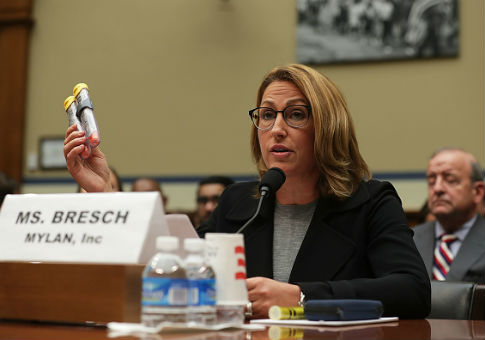Heather Bresch, the CEO of Mylan N.V., argued she and her company, which drew controversy for increasing the price of EpiPen devices by nearly 500 percent, had nothing to apologize for since they were "operating in the system that existed."
Bresch, who is also the daughter of Democratic Sen. Joe Manchin (W.Va.), appeared Monday on CNN's "Boss Files" podcast with Poppy Harlow to discuss her tenure at the helm of the pharmaceutical giant.
Mylan first sparked controversy in 2016 when it came to light the company raised the price of a two-pack EpiPen injector from around $100 in 2007, when it first acquired the life-saving treatment, to over $600 in 2016, when it controlled 85 percent of the drug's the market share. The company's decision to hike the price of EpiPen 15 times, nearly 500 percent, in less than a decade drew widespread rebuke and accusations of price-gouging.
In between commenting about the "ambition gap" between men and women in corporate America, and the need to properly "classify" paid parental leave, Bresch was asked what drove Mylan's decision to hike the price of EpiPen's to historic highs.
The CEO claimed it was important to grasp the "broken [pharmaceutical] system," where prices rise annually, to understand why Mylan acted in such a manner.
"First, in context, I do think it's important — and I have again said this — that to understand the system, and it is a broken system for sure," Bresch said. "But the system, of the fact, that prices increase for every product ... It's the only industry that price goes up every year, whether you're on the market 30 years, 40 years, 50 years."
She added that pharmaceutical companies often use the profits made from increasing prices on the drugs they manufacture to reinvest in their companies.
"There's a lot of reasoning for that," Bresch said. "Taking those dollars, you're reinvesting them in the product itself, you're re-investing them to bring other products to the market. There's a whole portfolio of reasons about why these prices increases happen and what then that money goes to [in terms of] reinvestment."
The CEO admitted that Mylan used the profits increased from hiking EpiPen prices to invest in "brand awareness" in an effort to ensure her drug was purchased in greater volume.
"Mylan, at the time, we had invested, over this decade that the prices increases happened, we had invested about a billion dollars back into EpiPen and to the awareness," Bresch said. "I realize that people were very ill prepared for an anaphylactic event, in fact, were very ill-informed about anaphylaxis ... so we did brand awareness, we changed the product design ... we did a lot of things."
Bresch's comments mirror those made at the height of the controversy, where she defended the price increases and her own accompanying rise in salary — from $2.4 million in 2007 to almost $19 million in 2016 — as on par with rising health care costs.
Harlow also asked the CEO if the public backlash against Mylan changed her "as a leader."
The CEO stated the controversy was a "defining moment" for her career and forced her to weigh how to adequately respond.
"There is no question that was a defining moment," she stated. "I realized I was being swept up into a national dialogue that was needed and I was being used ... to illustrate a point and I knew I needed to do one of two things about that."
The CEO asserted that while she would act to lower the drug's price, by releasing an EpiPen generic that cost $300 instead of $600, she would refuse to apologize for "operating in the system that existed."
"I could, I guess, go curl up in a corner, just say I'm sorry and lower the price," Bresch said. "[However,] I wasn't going to be apologetic for operating in the system that existed."
The initial media scrutiny of Mylan launched an internal audit by the Department of Health and Human Services, which found the company likely overcharged taxpayers by $1.27 billion over a 10-year period. Mylan finalized a settlement with the federal government in August 2017, agreeing to compensate $465 million for misclassifying the EpiPen to avoid paying Medicaid rebates. As part of the settlement, Mylan was required to enter into a corporate integrity agreement with the Department of Health and Human Services Office of the Inspector General.
Mylan has long been a controversial topic for Manchin, who faces a tough re-election battle this year in a state that President Donald Trump carried overwhelmingly in 2016.
Not only was it revealed that Mylan and its subsidiaries witnessed a sudden spike in government funding after Bresch took over as CEO in 2012, but the company's executives have donated heavily to Manchin in recent months even as Mylan planned layoffs at its West Virginia plant.
